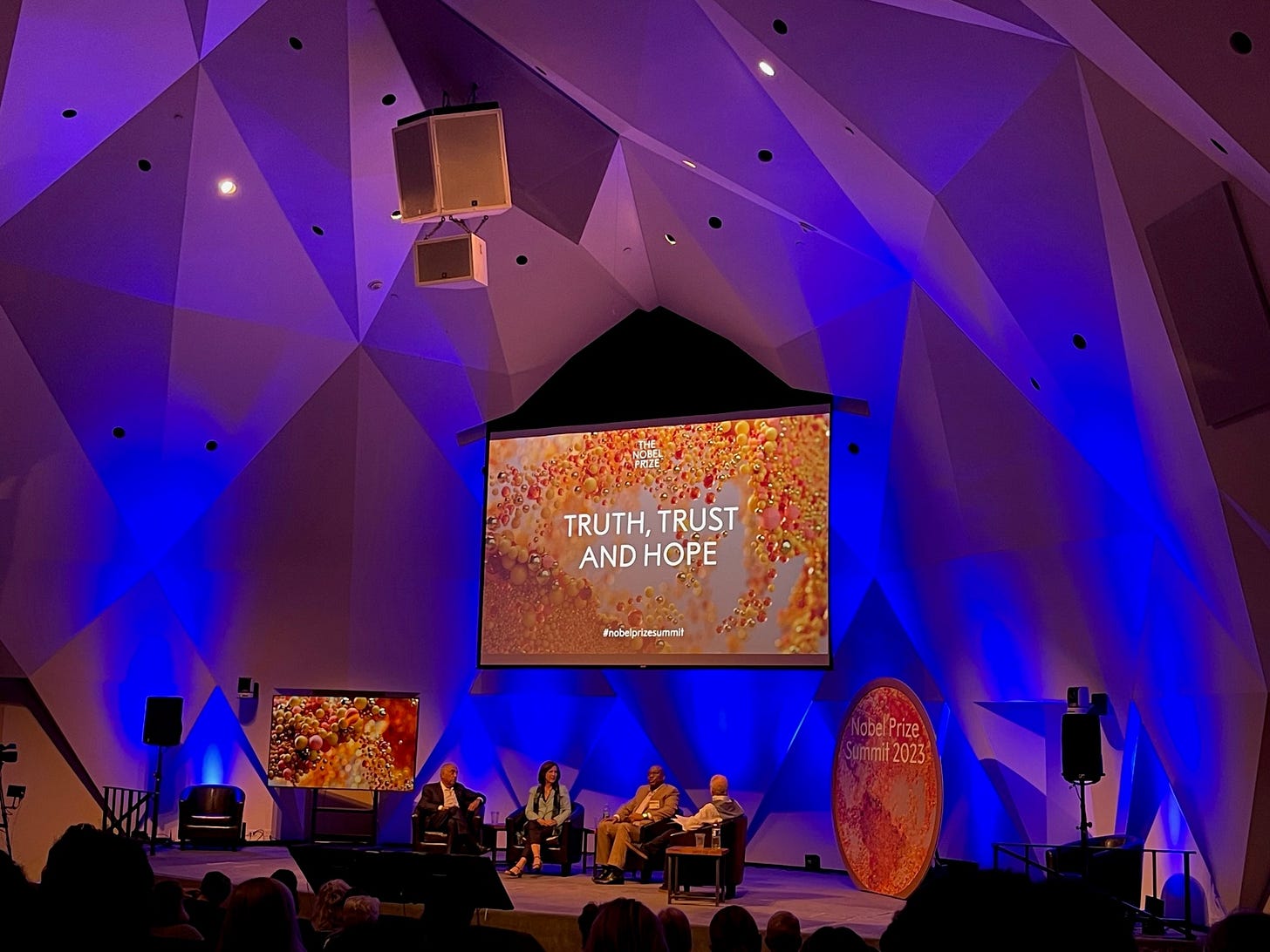Truth, Trust, and Hope: My Day at the NAS 2023 Nobel Prize Summit
I’m writing today from the National Academies of Sciences, Engineering, and Medicine, where I am participating in the Forum of Experts at the Summit.

Hello dear readers! I’m writing today from Washington, DC, where I’m attending the National Academies of Sciences, Engineering, and Medicine 2023 Nobel Prize Summit. You, too, can watch the talks at the Summit. They are being live-streamed, and the recordings are also posted on the Summit website. I was invited to attend Day 2 of the summit Forum of Experts to discuss ways to combat health disinformation. One major goal of the Summit is to foster collaboration among scientists and social innovators to foster an environment of truth, trust, and hope in science.
The accurate communication of science is not only important to scientists but also critical to the public. The scientific enterprise in the USA is only possible through government support, and in turn, only possible due to tax dollars. Science belongs to the people, yet scientists are often ill-equipped to translate the intricate nuances of our fields and findings to the lay public. Moreover, bad actors can spread disinformation and foster distrust in science through social media platforms at a rate never seen before. This goes well beyond the individual but can reach levels of government in the hands of totalitarian regimes. Innovations in Artificial Intelligence (AI) are making the waters even muddier: what is an indisputable ‘fact’ versus an AI-generated ‘fact’, which may have no basis in reality? Cooperation between governments, civil society, and scientists is essential. Data transparency and regulation of these new and emerging tools are crucial to securing peace and democracy.
Here are some of the major points I gleaned from the forum and discussions among experts and Nobel Laureates.
Challenges
The average person may be unable to distinguish between an expert and someone marketing fraudulent information.
The challenge of ‘snake oil’ salesmanship is not new, but the internet has opened up new lines of communication and created new networks through which misinformation can rapidly spread.
The era of AI and deep fakes is upon us. It is becoming even more challenging to distinguish trusted sources of information. We need to think carefully about how these technologies could shape society in the future.
Lessons Learned from COVID-19
Science saved us from even higher death tolls through innovations in vaccine and home testing technology. At the same time, our incapacity to clearly communicate the nature of the virus, how the vaccines work, and why public health measures are needed to stem the spread of disease failed us all.
Within my field of medicinal plants, a number of bad actors emerged with profit motivations to sell untested (and even dangerous) herbs to the public during the pandemic. As a science communicator and expert in medicinal (and poisonous) plants, I felt an obligation to the public to correct the disinformation emerging on the use of quinine and cinchona bark and for oleander.
I wrote about these topics in The Conversation. While some people were grateful for the guidance, I was shocked by the number of people who responded to the pieces with hate and vitriol for the science communicator (me). It was an important lesson for me on the power of emotionally charged misinformation in creating distrust in experts or fostering confusion over what is or is not a reliable source of information.
You can read the articles here:
One of the challenges that has become evident is that humans (even among those with higher education) respond most strongly to social media sources that they are emotionally connected to. Scientists think about the data and make decisions based on data. However, emotional motivations can have real impacts on health behavior. This is in part reinforced by how social media works—the more emotionally charged the post is, the more clicks (and thus more platform revenue) they receive! All too often, these popular posts are not based on scientifically vetted information.
It's easy to understand how the flood of information can confuse folks. As a specialist in biomedical sciences, I recognize that someone with specific training and experience in epidemiology is a more reliable voice in interpreting and communicating rapidly emerging public health data than another educated person from another field (e.g., a foot surgeon who has an MD and is undoubtedly bright but is NOT trained in the nuances of epidemiology).
Has trust in science eroded?
In short, most participants in the Summit agree that trust has eroded and is an urgent issue to address. Nobel laureates on the panels repeatedly noted that it is vital to speak up and speak loudly for thoroughly scientifically vetted information.
The Takeaway
Truth. Trust. Hope. These three words say it all. In a time when misinformation spreads at a rapid pace, we must fight for the truth. We need to identify trustworthy sources of information, especially when that information can affect our health or even influence life or death decisions. While challenges await in our future, summits like this one give me hope that through collaboration across disciplines, we can make a difference in the fight against misinformation and stand up for truth.
Yours in health, Dr. Quave
Cassandra L. Quave, Ph.D. is a scientist, author, speaker, podcast host, wife, mother, explorer, and professor at Emory University School of Medicine. She teaches college courses and leads a group of research scientists studying medicinal plants to find new life-saving drugs from nature. She hosts the Foodie Pharmacology podcast and writes the Nature’s Pharmacy newsletter to share the science behind natural medicines. To support her effort, consider a paid or founding subscription, with founding members receiving an autographed 1st edition hardcover copy of her book, The Plant Hunter.




